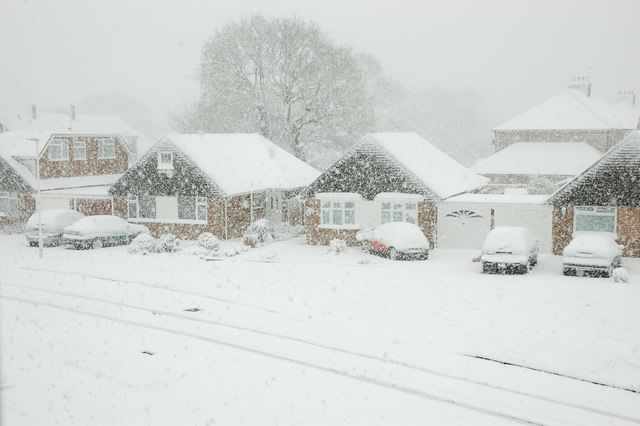By James Simons-
Heavy snow has fallen in Leeds overnight with roads blocked and dozens of schools shut on Friday, March 10. A rare amber weather warning is in force by the Met Office with a warning that places could see 19 hours of disruption.
Schools across West Yorkshire were closed yesterday due to snow and more are expected to be shut today. The Met Office weather warning is in force until 12pm today.
It warns that heavy snow is likely to cause significant disruption on Friday with people told to expect “travel delays on roads” amid fears some motorists could be left stranded in the snow.
Filming for Emmerdale had to be ditched after the ITV soap’s set in Leeds was hit by heavy snow from Storm Larissa.
Actor Nick Miles, who plays Jimmy King, revealed the news on social media, tweeting: “Filming on Emmerdale cancelled today due to the snow. Look out Leeds. We’re all going sledging.”
The Met Office says: “Some delays and cancellations to rail and air travel are likely and there is a good chance that some rural communities could become cut off.”
Hundreds of stranded drivers have been stuck in “never-ending” miles-long tailbacks overnight in heavy snow – and forecasters say blizzards are on the way and will cause “treacherous conditions”.
Travellers have been warned of train and flight cancellations, while the Met Office says the cold snap is moving south, as Storm Larisa continues to batter the country.
“We have managed to keep the heaters on… I have got my 15-year-old son here with me. I think he thought I was being dramatic, but I was like, we need to take blankets, we need to take coats, just in case, so we were well prepared.”
Merseyrail, which runs train services in Merseyside and surrounding areas, said its operations would not start until around 10am on Friday due to the severe weather.
The majority of flights departing Liverpool John Lennon Airport were delayed on Friday morning due to “heavy snow falls” and passengers were urged to check with their airlines for further details and updates.
The Met Office has a number of yellow weather warnings in place for snow and ice, including two covering most of Scotland, northern and eastern England, parts of the Midlands, and southeast England until 12 noon.
Two weather warnings for ice have also been issued until 10am on Saturday for most of England and Wales, with the exception of southwest and southeast England and western Scotland.
Areas of the Highlands could see -17C, after this year’s record low of -16C was recorded at Altnaharra in the region.
People in the south of England are likely to experience the worst of the rain.
The Met Office has said an Arctic air mass from the north meeting mild air from the south is causing the current turbulent weather over central areas of the UK.
Snow is statistically more likely in March than it is in December in the UK.
March 2013 was the UK’s coldest winter month since 1962, with snow falling towards the end of the month, according to Dr Mark McCarthy, of the Met Office’s National Climate Information Centre/
The notorious “Beast from the East” blew into the UK in March 2018.
The Met Office has said it is too early to assess how the snow record for this March will sit alongside previous years, but that this cold spell will be a “memorable one” for many.The UK gets on average 23.7 days of snowfall or sleet a year, according to analysis of data between 1981 – 2010.
Most of this snow falls on higher ground where temperatures are lower.
Scotland sees a higher amount of snow with snowfall or sleet occurring on 38.1 days on average.
It recorded its coldest March night in 13 years on Wednesday when temperatures dropped to -16°C at Altnaharra in the Highlands.
The likelihood of snow is higher between January and March than in December, with snow or sleet falling an average 3.9 days in December, compared to 5.3 days in January, 5.6 days in February and 4.2 days in March, the Met Office said.
Between 26 February and 8 March 2018 areas across the UK experienced a spell of severe winter weather, very low temperatures and significant snowfall.
Mr McCarthy said this period, when the “Beast from the East” brought bitter winter weather conditions to the UK and March 2013 were both notably cold.
In a post on the Met Office website, he said: “For the first three days of March 2018 there were more than 100 weather observation stations recording at least 2cm of lying snow.
“Just over 50 of these stations had 10cm or more for those first three days. In some locations this snow persisted until 18 March when there was another widespread snow event.”
Some people, including babies and children under five and people aged 65 and over, are particularly vulnerable to the extreme cold weather conditions.
The NHS urges people in at-risk groups, which include those on low incomes who cannot afford heating, to seek medical help as soon as they feel unwell.
It also advises people to heat their home, if possible, to at least 18°C in the rooms that they regularly use and keep bedroom windows closed at night.
The Met Office encourages motorists to take extra care on the roads as conditions can be considerably dangerous.




